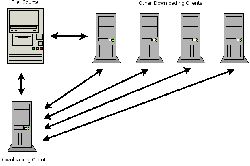Bandwidth Throttling
From Computing and Software Wiki
(→Reasons for Throttling) |
(→Reasons for Throttling) |
||
| Line 4: | Line 4: | ||
[[Image:Torrents.png|thumbnail|right|250px|Torrents allow for faster downloads, but may degrade network performance.]] | [[Image:Torrents.png|thumbnail|right|250px|Torrents allow for faster downloads, but may degrade network performance.]] | ||
| - | Organizations which practice bandwidth throttling cite that 95% of their users are negatively impacted by the large bandwidth consumption of a few heavy use bandwidth consumers.[1] The large consumption comes from users accessing large files over their ISP's network, such as music, streaming video, movies, etc. In recent years high-bandwidth content has become increasingly commonplace online, and thus the load on ISPs has increased as well. These large files can take a long time to download, and to help reduce this time, many users download via BitTorrent. BitTorrent can increase download speeds as it not only allows you to download the file from the original host, but to download pieces from other users downloading the file as well, vastly increasing the sources to download from simultaneously. BitTorrent can greatly increase the load on a network as not only does a single user download its file from many instead of one, but while they are downloading they also upload pieces they have to other users also downloading the file. | + | Organizations which practice bandwidth throttling cite that 95% of their users are negatively impacted by the large bandwidth consumption of a few heavy use bandwidth consumers.[1] The large consumption comes from users accessing large files over their ISP's network, such as music, streaming video, movies, etc. In recent years high-bandwidth content has become increasingly commonplace online, and thus the load on ISPs has increased as well. These large files can take a long time to download, and to help reduce this time, many users download via BitTorrent. BitTorrent can increase download speeds as it not only allows you to download the file from the original host, but to download pieces from other users downloading the file as well, vastly increasing the sources to download from simultaneously. BitTorrent can greatly increase the load on a network as not only does a single user download its file from many instead of one, but while they are downloading they also upload pieces they have to other users also downloading the file. During peak hours when network use it at it's highest some ISPs are finding that users who are only accessing web pages and using low bandwidth services like instant messaging are finding their network speeds degrading due to the high user of a few high bandwidth users. If bandwidth throttling techniques are implemented on a network experiencing this congestion, high bandwidth users would have their usage reduced, increasing the performance of the lower bandwidth users on the network. |
== Throttling Methods == | == Throttling Methods == | ||
Revision as of 03:06, 13 April 2008
Bandwidth throttling is a practice sometimes undertaken by Internet service providers (ISPs) to either reduce the traffic on their network, or to inhibit certain types of traffic. This is done in order to improve the experience of other network users or traffic types. One method of bandwidth throttling is called a bandwidth cap, which limits how much data a single user may use before being cut off. Another method is traffic shaping, which limits the speed of certain types of Internet traffic. Recently there have been some social/legal concerns over large corporations restricting traffic in this manner as it benefits several of their other offerings unfairly.
Contents |
Reasons for Throttling
Organizations which practice bandwidth throttling cite that 95% of their users are negatively impacted by the large bandwidth consumption of a few heavy use bandwidth consumers.[1] The large consumption comes from users accessing large files over their ISP's network, such as music, streaming video, movies, etc. In recent years high-bandwidth content has become increasingly commonplace online, and thus the load on ISPs has increased as well. These large files can take a long time to download, and to help reduce this time, many users download via BitTorrent. BitTorrent can increase download speeds as it not only allows you to download the file from the original host, but to download pieces from other users downloading the file as well, vastly increasing the sources to download from simultaneously. BitTorrent can greatly increase the load on a network as not only does a single user download its file from many instead of one, but while they are downloading they also upload pieces they have to other users also downloading the file. During peak hours when network use it at it's highest some ISPs are finding that users who are only accessing web pages and using low bandwidth services like instant messaging are finding their network speeds degrading due to the high user of a few high bandwidth users. If bandwidth throttling techniques are implemented on a network experiencing this congestion, high bandwidth users would have their usage reduced, increasing the performance of the lower bandwidth users on the network.
Throttling Methods
Bandwidth Cap
Bandwidth caps are a simple method of bandwidth control used by ISPs, which limits the amount of bandwidth (upload and/or download) a user may use within a certain time period. This method has been commonplace for years, and although not all people agree with a bandwidth cap there has been few debates about the practise as it is applied neutrally to all, based on the ISP one registers with. ISPs typically offer a pay per gigabyte option for use beyond the maximum bandwidth limit.
Traffic Shaping
Something.[2]
Social Issues
Chosing what data get throttled / users
References
1. Azureus Wiki A popular BitTorrent client Wiki page
2. Chris Sorensen, "CRTC asked to stop Bell's 'throttling'," Toronto Star: Business. (Saturday April 5, 2008)
See Also
External Links
Rogers Communications Inc. High Speed Internet Comparison
Canadian Radio-television and Telecommunications Commission
Canadian Association of Internet Providers
Signature
--Mcconkbp 01:02, 9 April 2008 (EDT)

